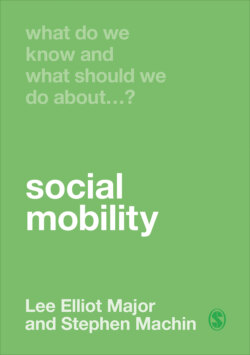Читать книгу What Do We Know and What Should We Do About Social Mobility? - Lee Elliot Major - Страница 15
На сайте Литреса книга снята с продажи.
Decade of Economic Decline (1970–80)
ОглавлениеThe 1970s are remembered for stagflation – the combination of rising inflation and unemployment brought about by the global recession. Inflation rose to double figures, reaching over 25 per cent in the mid 1970s; 1.5 million people were unemployed by 1978, nearly triple the figure of a decade earlier. It signalled declining absolute mobility.
Throughout the 1970s successive governments seemed to be constantly teetering on the edge of crisis. In 1974, the Conservative government introduced the Three-Day Week to restrict electricity use in homes, as the national economy nosedived, exacerbated by global oil price hikes. In 1978, the Winter of Discontent witnessed widespread strikes by public sector trade unions, symbolised by mounting piles of uncollected rubbish on streets across the country.
Education debates were dominated by growing concerns over falling standards, while governments were forced to cut public expenditure for schools. In the 1972–3 school year, the school leaving age was raised to 16. The tripartite system of selective, secondary modern and technical schools had failed to create any parity of esteem between children pursuing academic and vocational routes. The majority of children who did not get into grammar schools were consigned to an inferior education. The system was dismantled. By the end of the decade, over 90 per cent of schools were comprehensive. Private schools meanwhile saw a marked improvement in academic performance during the period. The proportion of young people going to university declined between 1970 and 1980.
For all this apparent decline, the 1970s did not see any discernible changes in inequality of incomes, nor in relative social mobility levels. The rungs of society's ladder were no wider, but movement between them no greater.
With 91 per cent of Cabinet members educated at private schools, Margaret Thatcher's Conservative government in 1979 looked strikingly similar to Macmillan's two decades earlier. Thatcher, the grammar-school-educated daughter of a shop keeper, would end the post-war consensus on state intervention, adopting a Darwinist approach to social mobility (Mandler, 2015). Individuals and families would improve their lives through competition based at least in theory on hard work and a little self-help. Thatcherism introduced a new language of aspiration.
